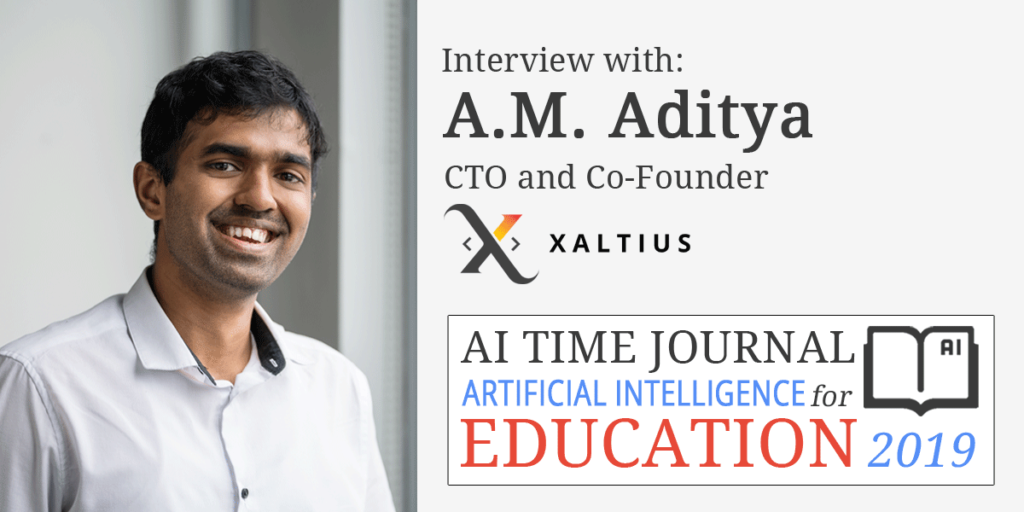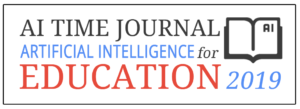
A.M. Aditya is the CTO and Co-founder of Xaltius, a Singapore-headquartered company that provides enterprises with AI product development and training services.
Mr. Aditya is also a committee member in the AI for Education 2019 Initiative, an AI Time Journal initiative which aims to identify and highlight the most beneficial and impactful applications of artificial intelligence technology in education.
In this interview, Mr. Aditya discusses the state of the art and future trends of AI technology in the educational sector, as well as his work at Xaltius.
This interview has been
featured in the AI for Education Initiative 2019.

AI in Education Q&A
What are the major challenges in the educational system today? How can AI technology help solve or mitigate them?
Well, education has been at the forefront for a long time. People have tried to devise ways to better the system and address various challenges. There are a few major challenges in the educational system today, both in online and offline systems.
Firstly, personalized learning is one of the big requirements today, in any grade of the educational system, right from schools to corporates. There is an inadequacy of methods of being able to provide this to a wider community of people.
Secondly, the adoption of new technology is one of the key issues. It is highly difficult to convince and make people pick up new technology because of the learning curve involved and other overheads that come with it. Resistance to change is a big hurdle.
Thirdly, the number of resources out there today, across the ‘www’ is massive and choosing the right learning path and content is an arduous task and involves loads of research and reading, which most people do not bother doing.
All the above problems can be solved to some extent using modern technologies, especially Artificial Intelligence (AI).
- AI can help curate content suited to the needs of an individual based on the requirements of the individual and also suggest a learning path.
- AI can personalize content for every individual.
- AI created effectively with good user experience can drive adoption levels up.
- AI can monitor experiences and provide better feedback to individuals.
Albeit, AI cannot solve everything completely, it definitely provides more direction and mitigates challenges.
What are the major opportunities brought by AI in Education today?
The use of AI in Education is growing day by day and will continue to grow over the next decade or so at a rapid pace. It is expected that artificial intelligence in U.S. education alone will grow by 47.5% from 2017-2021 according to the Artificial Intelligence Market in the US Education Sector report. There are numerous opportunities where AI plays and can play a major role in shaping the education industry more efficiently. Some of them are listed below:
- Collaborative AI – can help bridge the gap between educators and digital systems and platforms. Today, there are a lot of skill testing systems, which test individuals for different skills and AI can help remove most of the manual checking process by intelligent evaluation. Hence, by leveraging the best practices of educators and machines, AI can help drive efficiency.
- Personalized AI – As spoken about earlier, personalization is the way forward. Adjusting learning methodologies and systems automatically, based on attributes of an individual. This will help identify gaps and improve efficiency tenfold.
- Universal Access using AI – There are students and educators all around the world. AI can help eradicate the language barrier by making content available to all irrespective of which country individuals stem from or what languages they speak.
- Back Office AI – AI can help automate many of the back-office tasks, like evaluation, administration and others which eliminates a lot of inaccuracies which might otherwise be created by people.
These, along with other potential use cases can help accelerate AI in education quite to quite an extent.
How can teachers prepare for an AI-powered education?
AI is reaching the masses and the only way it can reach the students in through the educators and the teachers.
- It is very important for educators and teachers to upskill themselves and be aware of the latest technologies in the market and being used in the education industry.
- Teachers should open up to adopting these methods with an open mind and learning about it.
- It is the responsibility of the software developers creating AI powered education software to empower the teachers in the right way to learn and adapt using the software.
- Teachers can be taken through workshops and TTT sessions by AI professionals and software designers to learn more about the basics of AI and integration with the software.
Which AI technology do you think will have the biggest impact in Education in the coming years, and why?
We all know AI has many different aspects to it and there is no one particular part of it which can provide an answer holistically. According to me, AI (machine learning + deep learning + computer vision) coupled with recommender systems will be an important combination of technologies which could have an impact on various Education Technologies in the coming years. Also, cloud will become an integral part of an AI-based technology owing to its scalability and flexibility.
Education technologies such as feedback systems, monitoring systems, evaluation and regulatory systems will include the above-stated technologies to provide a seamless experience.
How should educational system management software adapt for the advent of AI?
Educational System Management Software should be built on the strong foundations of scalability and robustness. This is very important for AI to fit in.
In terms of technology, it should be cloud first, be able to collect and process data for use by the AI systems and provide a very good user experience. With AI, user experience is a big factor and should be the forefront of all such systems.
On the other side, systems should be affordable such that the addition of AI does not kick in a massive increase in price. Everyone should be able to use and access it.
Do you see threats of inequality in the access to AI-powered education?
AI based educational systems must be made affordable to the masses.
If not, everyone will not be able to adopt it and yes inequality will definitely be a threat when it comes to access to AI powered education. Only large institutions with financial backing would be able to use and adopt it whereas smaller ones will be left behind.
What are the current technological limitations of AI which, once overcome, could bring massive improvements to the educational system?
AI addresses certain components of the educational system effectively, but there are still some impending limitations which need to be dealt with before it becomes more robust and adoptable.
- Dealing with emotional intelligence – AI, though can be very intelligent, fails at certain aspects when aspects involving emotions stem in. In the educational sector, it is a big factor since a lot of it is involved.
- Bias in AI – This has been a problem in AI for a long time. External factor skew AI results, sometimes to quite an unreasonable extent and this is something which needs to be addressed in the long run.
- Clean data – AI depends a lot on clean data. Data collected today is not strategized, organized and clean. Organizations are adopting this practice today such that in the next five years or so there would be much cleaner data for AI to work with.
- DevOps around AI – DevOps is a very important factor in any application life cycle or data science life cycle. DevOps for AI is coming into play as we speak today and is becoming more pervasive. Once the practice has a concrete establishment it can bridge many gaps.
These are some of the challenges, which if addressed can brings massive improvements.
What do you think are the biggest obstacles to applying AI in the educational system?
AI is slowly making its way into the educational system, but yes, there are a few hurdles to cross before it can completely penetrate the system:
- Management Buy-In is one of the biggest hurdles. Institutions perceive AI as an extra burden to the current work they do and hence prefer the old school ways of doing things.
- Lack of Knowledge – People are not aware of AI and how it can help in various sectors of the educational support. People fail to understand that it is a collaboration rather than AI taking over.
- AI is not completely perfect yet – There are a few more years before most of the tasks related to the educational system can become assistive. Education has a lot of subjectivity and emotion involved which currently AI cannot deal with.
AI will not replace education completely or take over the tasks of educators. Educators will always be required.
Where do you see AI for education in the next 5-10 years?
Over the five to seven years, AI will definitely start seeping its way into the educational system at a faster rate in certain aspects like evaluation, administration, recommendations, chatbots, feedback and a few other solvable tasks. People will start adopting technology and investing in it more freely. There will be numerous AI and AR driven platforms which will make learning a fun and easy task.
It will NOT replace education completely or take over the tasks of educators. Educators will always be required.
Xaltius Q&A
What is your background?
Post my bachelors in electronics, I have worked in consulting for 4 years for various projects and clients across various technologies before moving to Singapore to pursue my Master’s in Data Science. This is where I started Xaltius with two other co-founders in late 2017, simultaneously gained experience working with a consulting and flying all over the ASEAN region, before translating completely on Xaltius. Now I wish to pursue this endeavour and take Xaltius to greater heights.
How was Xaltius started?
Xaltius was born out of a team of two of the current founders winning an Education Technology Hackathon in early 2017. That was the pivot which stirred us to form this company to take up both Education and Technology and build something which could help people learn better.
Xaltius has a mission statement of making technology reach the masses and helping customers drive business efficiency.
Who are Xaltius’s customers?
Xaltius has two types of customers:
- Organizations who want AI as part of their business practice – and we create value for them by imparting knowledge of the AI roadmap and providing services to help them embark on their journey.
- People who want to learn AI – and we create value by conducting interactive training and workshops which help in upskilling people in the fields of Data Science and AI.
What challenges do your customers face that Xaltius can help them overcome?
The main challenges which the customers face are:
- People not having enough knowledge about Data Science and AI practices and technologies.
- People not being competent enough to embark on the Data Science and AI journey in terms of concepts and technology
- Technology is very fast moving and it is difficult for customers to keep up.
Xaltius can help both these kinds of challenges by providing the right services and training.
Tell us about the Xaltius team.
The three main founders of Xaltius are all National University of Singapore Alumni with Masters in Data Science and Analytics and have a combined industry experience of more than 20 years across various industries of Retail, Automotive, Defence and others.
Other members of the team come from different business and technical background with a lot of industry experience.
How many data scientists and machine learning engineers do you have in your team?
Being a small start-up, we currently have two experienced data scientists/engineers in-house. For our trainings, we occasionally hire on a contract basis.
Which technology stack are you experts on and are you leveraging the most?
As a start-up company, we work on and are good at the following technologies:
- On the open-source side, we deal with Python, Spark and R extensively.
- We leverage the AWS cloud platform to deploy all our applications owing to the scalability of the cloud.
- On the BI side, we are good with tools like SAS, Tableau and PowerBI.
- For Big Data projects, we make use of a tool called Databricks for development and deploying workloads.
There are other technologies we work on, on a case by case basis as well.
What skills do you look for when hiring data scientists and machine learning engineers?
The main things we look for when hiring data scientists/machine learning engineers are:
- The ability to think logically about a problem
- Knowing the basics of programming, preferably Python and some of its associated libraries.
- Knowhow of how algorithms work.
- The basic data science process and in-depth of different processes like data cleaning, data mining, and data analysis.
- Presentation skills, both in terms of tool-based reporting and high-level presentation.
What are the biggest challenges in business and technology that you are currently facing at Xaltius?
Some of the biggest challenges we face are:
- All the main people being from a technical background, some business decisions used to take longer than expected.
- Being a start-up, acquiring customers is a big challenge and we try our best to network and showcase to reach out.
Walk us through Xaltius’s products, and what problems they solve.
Xaltius has three main products it is working on:
Traveltomo (B2C) – An AI powered travel itinerary generator based of customer personalities and travel history.
XinQ (B2B) – An AI powered document and knowledge management system to bridge gaps in SMEs in various business processes.
FastLearn(AR) (B2B and B2C) – An AR and AI powered application for healthcare related equipment to allow people to learn more interactively, from students to medical professionals.
XinQ currently is the product we are reaching our customers with, although we are focusing on developing the FastLearn(AR) product currently.
XinQ is definitely creating the most value at present since it involves a lot of features which are required in SMEs today, especially in industries dealing with logistics of any kind. The platform provides simple features which are pain points and at the same time leverages AI to perform functions such as intelligent search, OCR, Object Recognition and so on.
We customize our product based on the need of the customer by understanding the requirements of the customer, their pain points and their immediate objectives.
How is AI leveraged in your product?
We use various techniques of AI across our products, be it machine learning or deep learning, for various features such as intelligent search, object recognition, OCR, recommendations among others.
How do you measure the performance of your technology?
We do multiple forms of comparative analysis and testing on our products, to test for scalability, storage and processing issues, and breaks. Post internal testing, we do a round of testing with our customers (pilots) and get their feedback on the performance of various features and tweak the product accordingly.
What is the roadmap of your product?
For XinQ, we hope to roll it out to more customers this year and the next and add in additional features as required by customers.
For FastLearn (AR) we hope to complete development in the coming months and will be looking for interested customers/organizations to work with into scaling and customizing the product.
What are Xaltius’s biggest achievements in the last 12 months?
In the past 12 months, some of our achievements include partnering with some big academies in Singapore and India to impart AI education and working with some corporate clients on AI based projects.
We are looking at this year to expand more into those markets in Singapore and India.
